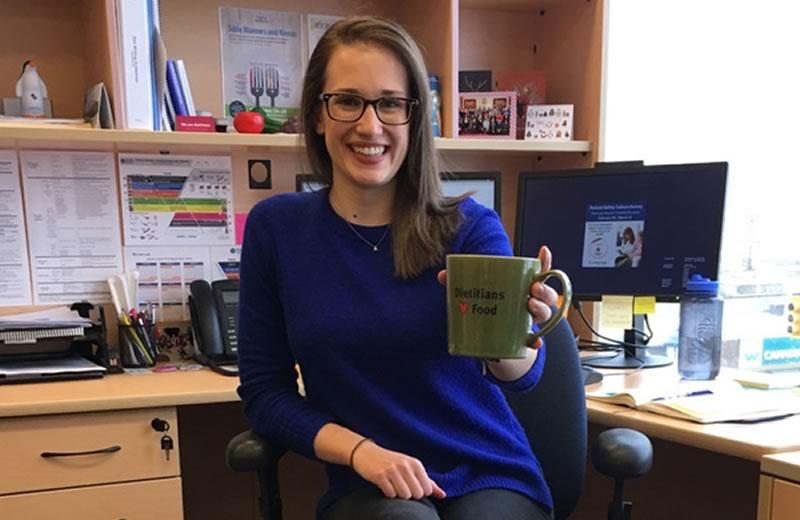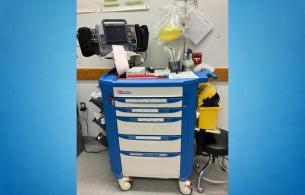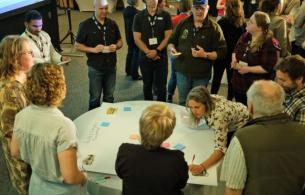After interning with Northern Health in June 2018, Allie Stephen, originally from Ottawa, worked in many different areas of nutrition. I recently talked to her about why she loves being a dietitian and how food services and quality improvement projects can create positive change for staff and patients.
Tell me about your career as a dietitian, and what is CBORD?
After my internship, I started working at UHNBC [the University Hospital of Northern BC in Prince George] as a casual clinical dietitian, and got to work in different areas of the hospital with inpatients and outpatients.
In September, I started at the Northern Health Regional Diet Office in my current role as the CBORD Quality Improvement Dietitian.
CBORD is a food and nutrition computer system used in healthcare – it’s used to facilitate food services in all our hospitals and long term care facilities. Using CBORD, the Regional Diet Office maintains menus, patient/resident diet and allergy information, and supports other CBORD users (including Food Services staff, dietitians, speech-language pathologists and occupational therapists) in managing patient/resident dietary needs.
I really enjoy the variety this position offers, from training CBORD users to enhancing dining experiences in long term care, to implementing international safety standards.
What’s your take on what dietitians do?
There are so many places you can find dietitians! They’re in food service, public health, on primary care teams and in hospitals, but also in grocery stores, private practice, education, and government.
In food services, a dietitian uses scientific evidence to build/manage menus and meet general nutrition needs, with the understanding that there will be (and should be!) adjustments made to further meet individual needs.
No matter where they are, dietitians help make nutrition information practical and meaningful. Being a dietitian comes down to being an advocate for wellness through food.
Could you describe a day in your life as a dietitian?
Every day is different. Usually my day-to-day involves some troubleshooting with CBORD users to make sure patients and residents are receiving meals that are appropriate and safe, while aligning with their preferences and recommendations made by their dietitian or health care team. Often I’m trying to think like the computer – it’s kind of like detective work!
Another big part of my day is regional food/nutrition project work. Right now, for example, my team is working to implement the International Dysphagia Diet Standardization Initiative (IDDSI). Dysphagia means “difficulty swallowing,” and IDDSI is a global initiative to standardize how food and beverages used in dysphagia management are named and described. This will help make sure we’re classifying them consistently, which ultimately promotes mealtime safety and quality of care.
A constant in my role is working alongside the Regional Diet Office, food services, and dietitian teams to look at innovative ways of providing enjoyable meal service to residents and patients.
Food is, after all, a big part of our lives and being able to enjoy our favourite foods is important!
What’s one thing someone might not know about your role?
I support a lot of the day-to-day use of CBORD, but I also support teams to take on food and nutrition related initiatives and projects. Most of these initiatives have to do with improving services and patient experiences. I love seeing all the initiatives that come to fruition.
What part of your role is the most rewarding?
At every Northern Health location there are people and team members who are so invested in the services they provide to patients and residents - they’re proud of the work they do. At the Regional Diet Office, we support them so they can take on projects that are important to their teams and communities.
For example, in Masset, they recently transitioned to a core menu where they’re doing more scratch cooking and home-made recipes. A lot of care was put into the transition – their dietitian, kitchen staff, recreation staff, and residents were all on board. The change was very well received and everyone involved was very excited to be a part of it.
It’s a great example of how our people are invested in providing the best care they can for patients and residents. I’m really happy to be able to support these kinds of projects and interact with different people across the North. The dietitian and food services teams in particular are great – I have a lot of respect for everyone I’ve been able to learn from and work with. I’m proud to be a Northern Health dietitian!
How to see a registered dietitian
Do you think you or your patients could benefit from talking to a dietitian?
- There are dietitians in various communities across Northern Health. A referral may be required. Talk to your health care provider to learn more.
- BC residents can also access Dietitian Services at HealthLink BC, by calling 8-1-1 (or 604-215-8110 in some areas) and asking to speak with a dietitian.














Comments